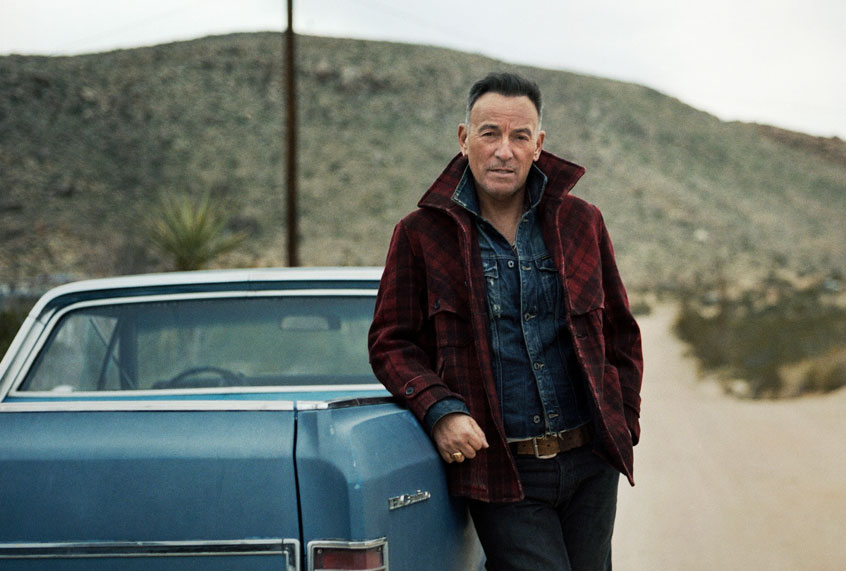With the release of his 19th studio album “Western Stars,” Bruce Springsteen elevates the trajectory of his magisterial career yet again. A great American storyteller in the vein of Woody Guthrie and Bob Dylan, Springsteen dares to be earnest in an age of mind-numbing cynicism.
During the album’s production, Springsteen playfully described the sound of “Western Stars” as “Grand Canyon music.” As with the national park’s cavernous, awe-inspiring immensity, “Western Stars” accentuates Springsteen’s character-driven narratives with the cinematic power of honest-to-goodness orchestration. But in truth, “Western Stars” has far less in common with classical music, with Springsteen eschewing such ornate, high-browed sounds for the grand sweep and lush arrangements of Southern California pop in the early 1970s.
As musical palettes go, drawing upon the heyday of the singer-songwriter era proves to be a deft choice for Springsteen’s latest album. A musical and lyrical tour-de-force, “Western Stars” offers one of Springsteen’s most coherent and carefully plotted LPs.
The album’s song cycle kicks into gear — and without preamble, no less — with “Hitch Hikin’,” the story of a free-wheeling wanderer living out his dreams and curiosities on the Southwest’s windswept highways. For the narrator, it’s a decidedly simpler time, a place where “Maps don’t do much for me, friend / I follow the weather and the wind.” By the time that “The Wayfarer” roars to life, the lonely realities and inherent dangers of being an unchecked rambler have begun to fracture the sunny optimism of Springsteen’s narrator. “Same sad story, love and glory, going ’round and ’round / Some old cliché, a wanderer on his way, slippin’ from town to town.”
The forward momentum of “Western Stars” continues unabated with “Tucson Train,” the moment when Springsteen’s wayfarer gives way to the tensions and anxiousness of ill-timed love. But with the title track and “Sleepy Joe’s Café,” the narrator regains his youthful whimsy, if only briefly, under the big sky of the Southwest, where he dances the night away at a folksy roadside bar.
The record’s turning point begins to drift into focus with “Drive Fast (The Stuntman).” “I got two pins in my ankle and a busted collarbone,” the singer tells us, and “a steel rod in my leg, but it walks me home.” In many ways, the stuntman exists as a kind of stock character in the lexicon of 1970s Hollywood storytelling, an aspect that Springsteen drives home with the chorus, “Just drive fast, fall hard.”
By “Chasin’ Wild Horses,” Springsteen’s narrator begins to succumb to the darkness that was all but invisible during the throes of “Hitch Hikin’.” With the album’s lush orchestration giving way to a rueful county and western ambience, the singer collapses in on himself, having delivered himself to an emotional crossroads.
Brimming with regret and felled by his own ill temper, Springsteen’s narrator hits rock bottom — quite literally — with “Stones.” While listeners have already likened “Western Stars” to the sounds of such classic 1970s artists as Glen Campbell, Gordon Lightfoot, and Harry Nilsson, “Stones” evokes the bold orchestral power of Aaron Copland. The song’s plaintive brass introduction effects a fitting background for the narrator’s heartrending realization that his romantic life has become riddled by the lies and betrayal of his lover’s easy duplicity. By the advent of “There Goes My Miracle,” the narrator can only wail at the awful measure of his loneliness and his loss. In so doing, Springsteen sets up two of his finest closing numbers in “Hello Sunshine” and “Moonlight Motel,” tales that communicate the gravity of encroaching adulthood as effectively as just about any composition in his incredible songbook.
In “Hello Sunshine,” Springsteen’s narrator begins to wrestle with the reality of his broken self, a self-admitted lost soul who has a “sweet spot for the rain” and is prone to “get a little too fond of the blues.” While he may finally be grown up enough to allow the sunshine to break through the lonely clouds of his damaged psyche, “Moonlight Motel” reminds us that there are more difficult bargains to be confronted just beyond the horizon. A gentle paean to the inevitable obligations that come with maturity and this simple act of growing older, “Moonlight Motel” finds Springsteen’s narrator bidding farewell to the romanticism of his youth. Now it’s all just “kids and bills and bills and kids,” he laments, having become an “empty shell” of his former self.
As one of Springsteen’s finest effusions on the darkness that threatens to undo our inner selves, “Moonlight Motel” finds the narrator at a loss for words, singing “that it’s better to have loved, yeah, it’s better to have loved.” Sitting alone and exhausted at the dusty bar of the boarded-up motel, he can’t even summon up the energy to admit the fatal breadth of his loss.
Co-produced by Springsteen and Ron Aniello, “Western Stars” offers a powerful, sobering narrative about life in these United States. By the end of the LP, he succeeds in bridging the wide-eyed optimism of his earlier self with the universalizing experiences of his everyman American characters. Featuring standout performance from a host of musicians — including wife Patti Scialfa, Jon Brion, David Sancious, and Soozie Tyrell — the album was brilliantly mixed by Tom Elmhurst, who imbues Springsteen’s narrative settings with expansive vistas of emotional power and grace at every turn.
For many listeners, “Western Stars” may understandably sound and feel like a much-needed nostalgia trip to a simpler time and place in comparison with our conflicted present. But for Springsteen, evoking a 1970s ambience is not merely an act of genre-experimentation, but rather, the setting for communicating even greater truths about the highpoints and heartbreaks of human experience.

